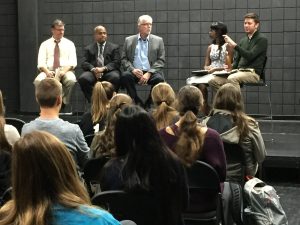This year’s presidential election between Hillary Clinton and Donald Trump has been described as many things: contentious, awkward, controversial, bizarre. But perhaps the best descriptor of this election is this: It’s personal. Like never before, Americans are vehemently debating, disagreeing and disrespecting each other on social media, and in person, in ways that cut at our moral core. It’s personal and political, which means things can quickly get out of hand.
Now imagine being a college student who is voting for the first time. It’s as if you are wading hip-deep in a murky mess of political polarization, looking for the right candidate to pluck out. And with so much to disseminate, emotions are running high. Reasoned, mature voices who are modeling civility may seem few and far between to rookie voters navigating such muddy waters.

Enter Vox Populi — five forums featuring interdisciplinary panels organized by the Office of Student Development. Using the Hope-authored document called the Virtues of Public Discourse as a guide, Vox Populi, meaning “the voice of the people,” tackles weighty topics that revolve around this dramatic election and seasons them heavily with five virtues needed to make discussion and dialogue both respectful and constructive: humility, hospitality, patience, courage, and honesty.
“We are using our Virtues of Public Discourse document to frame each event because we have a responsibility to our Hope community to see this election in both a more intelligent and holistic way.”

“We are not having CNN or Fox News screaming matches here,” said Chris Bohle, associate director of student life and main organizer of Vox Populi. “We are using our Virtues of Public Discourse document to start and frame each event because we have a responsibility to our Hope community to see this election in both a more intelligent and holistic way. That means we must help students see what being an informed voter, a critically thinking voter, and a civil voter should look.”
Vox Populi is student-driven, Bohle points out, as eight leaders from campus organizations* choose the topics very early in the academic year “that they needed and wanted to hear about.” Faculty and staff from various departments bring their experience to the panel discussions which have delved into party affiliation and Christianity, social media wars, post-truth politics, and politicized familial dissension.
Each of these tough topics seems somewhat more approachable within the intimate confines of the DeWitt Studio Theatre, when sagacious faculty and staff offer their expertise in both relational and concise ways. But it is the Virtues of Public Discourse that are the true stars and calming influence of Vox Populi. “If we set our gaze locally and exercise these virtues with our families and friends in our communities, then we can start to change the overall landscape because we’ve practiced in trying times,” said Dr. David Ryden, professor of political science and chair of the department.
So, talk politics and voice your views — remembering to be humble, hospitable, brave, patient, and honest — as if our nation depended on it.
“Do we need documents (like the Virtues of Public Discourse) to guide us?” asked Dr. James Herrick, the Guy VanderJagt Professor of Communication, at a panel on honesty in the election. “Yes, because these are not intuitive and we need reminders. Documents such as the Virtues of Public Discourse constitute us as a community and remind us of our standards when it feels inconvenient to live them out. Without such a statement of what we stand for, we run the risk of becoming a tactical community rather than a conversational one.”
The Virtues of Public Discourse fully engaged and on display in Vox Populi set an example for Hope students on how to civilly express their political views when all about them, bombastic and concerning conversations abound. Kathleen Muloma appreciated that most about the forums.
“Vox Populi has taught me that healthy, empassioned, educated conversations are possible,” observes Muloma, a sophomore chemistry major with a biochemistry emphasis and student director of Vox Populi. “We are not without hope for having honest discussions without pulling out hair or insulting the other person. Every time students attended, it reminded me that I am not alone in my desire for these healthy conversations, and that Hope students do want to talk about the controversial topics and are seeking opportunities to learn and get better in the context of the the Christian faith.”
Now with that hopeful sentiment, go ahead and talk politics, voice your views, and like Kathleen Muloma and others who have been enlightened by Vox Populi, remember to be humble, hospitable, brave, patient, and honest – as if our nation depended on it.
*Writer’s note: Vox Populi’s topics and programming were the brainstorming and organizational results of the following students and these groups: Kathleen Muloma, Student Director; Derek Chen, Hope Republicans Representative; Irene Gerrish, Hope Democrats Representative; Joseph McClusky, Residential Life Representative; CJ Proos, Student Congress Representative; Julia Fulton, Political Science Department Representative; Terah Ryan, SAC Representative, and, Mark Brice, Assistant Director of Residential Life and Housing.

